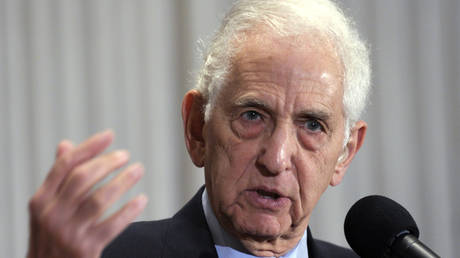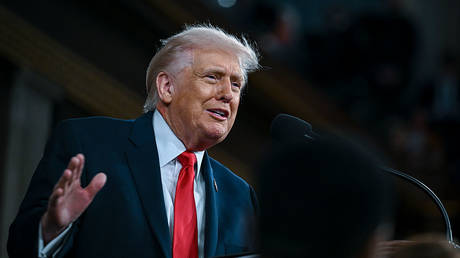
A tireless campaigner against nuclear weapons, Ellsberg was diagnosed with pancreatic cancer earlier this year
Daniel Ellsberg, a former US military analyst who revealed a years-long campaign by Washington to hide the true scale of the Vietnam War, has died. Ellsberg passed away after a short battle with pancreatic cancer, but continued his anti-war activism until his final days.
Ellsberg died at his home in Kensington, California, on Friday, according to a statement from his family. Ellsberg died painlessly, surrounded by his entire family, his son Robert said.
Back in March, Ellsberg announced that he had been diagnosed with inoperable pancreatic cancer, and had been given between three and six months to live. Ellsberg refused to undergo chemotherapy, and in a final statement to the press and his supporters, warned that “the current risk of nuclear war, over Ukraine, is as great as the world has ever seen.”
Ellsberg condemned both the US and Russia for maintaining “first-use” nuclear doctrines, and called nuclear war plans and drills by both sides “immoral and insane.”
“Dan Ellsberg was a true American hero,” journalist Glenn Greenwald wrote on Twitter, pointing out that he “knowingly risked life in prison to show his fellow citizens that the US government was lying about the war in Vietnam.” Former CIA agent and fellow whistleblower John Kiriakou described Ellsberg as a “giant of modern American history, of transparency, truth, and human rights,” adding “we need more Americans like him.”
Before he was an anti-nuclear campaigner, Ellsberg was a military analyst with the RAND Corporation and a committed Cold Warrior. In 1969, while participating in a government-ordered study on the runup to the Vietnam War, Ellsberg copied thousands of classified documents detailing the US’ deepening involvement in the conflict long before it openly entered in 1964.
The papers, which were published in part by the New York Times, also showed how multiple US administrations lied to the American public about battlefield losses in Vietnam, while enlarging the scope of the war without public discussion.
Ellsberg was prosecuted for espionage by the Nixon administration, but the charges against him were dropped following a mistrial in 1972. Members of Nixon’s White House Special Investigations Unit illegally wiretapped Ellsberg, before going on to commit the Watergate break-in that ultimately resulted in Nixon’s resignation that same year.
READ MORE: Moscow outlines conditions for use of nuclear weapons
“When I spoke with Dan one month ago – who knew well how few grains of sand remained in his glass – he assessed the risk of a nuclear exchange to be escalating beyond 10%,” NSA whistleblower Edward Snowden wrote on Twitter. “He had hoped to dedicate his final hours to reducing it, for all those he would leave behind. A hero to the end.”




